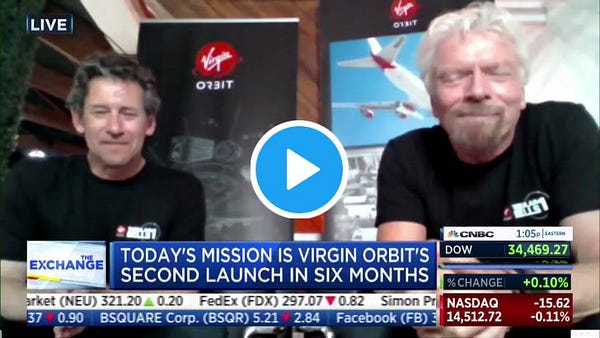Borkowski Weekly Media Trends 02-07-21
The Male Dominated Space Race | BrewDog "Solid Gold" Beer Fail | Love Island
Is space too male?
The new space race is taking place not between nation-states, but between individual males.
Jeff Bezos, who has recently announced he would step down from his position of CEO at Amazon to focus on space exploration, was long slated to be the first billionaire in space.
Not to be outdone, however, Richard Branson has just announced his ambition to board a test flight, thus beating Bezos to the wild black yonder by just 9 days.
Twitter users in some circles were excited, but still more released a collective sigh and felt that this confirmed just how ego-driven these pursuits are. Many feel there are worthier endeavours for the vast stores of wealth held by Bezos and his peers, including the pressing Earth-problems of climate change, food poverty, and global pandemics.
Meanwhile, the other towering male dominating space news, a swaggering Elon Musk, has gotten into a feud with the head of an aerospace competitor, Tony Bruno, belittling him on Twitter.

These types of braying and jockeying gives the impression that spaceflight is doomed to becoming—if you’ll forgive the expression—a zero-gravity pissing contest for the super rich.
This is an unfortunate outcome for the spaceflight, which inspired female science fiction writers like Ursula Le Guin and Octavia Butler to imagine a democratic, gender-blind and egalitarian future for humankind among the stars.
It is also surprising considering the emerging data that shows that women may well be better suited for long-term spaceflight than men.
In seeming acknowledgement of the male-connotation of spaceflight monomania, Blue Origin have added the pioneering female pilot Wally Funk, the 82 year-old who was prevented from becoming an astronaut in the 1960s because of her sex, to join Bezos on the company’s first human spaceflight. And, in interviews, Bezos has been consistent in crediting his mother with planting his ambition to cast his fate amongst the stars.
Clearly, spaceflight has a comms problem. Despite the countless women who have dreamed of, contributed to, and undertaken missions to space, the aspiration to transcend mother Earth and plant ones seed amongst the stars is seen as a male one.
Countering this view by spotlighting female astonauts is unlikely to change this larger negative perception. Until there are female captains of industry who devotes themselves to vanity projects with the same level of monomania, space will always be seen as just another male obsession.
BrewDog’s Solid Gold Beer Fail
It has been a rough month for BrewDog. After an open letter calling out the company’s "culture of fear" published by 100+ former employees went viral, CEO James Watt was forced to publicly apologise – despite attempts to rally current staff to write a counter-letter.
Sadly, they followed this bad press with a PR howler. In a Charlie and the Chocolate Factory inspired competition, BrewDog ran a derivative campaign giving punters a chance to “STRIKE GOLD WITH BREWDOG” – offering £25,000 of prizes including a “solid gold” beer can. They offered 10 people the chance to find a gold can hidden in a case of its beer.
Some of the winners were disappointed to find out that their “solid gold” can of beer was actually worth £500 (max) and that it was 24 carat gold plating that covered the can.
However, BrewDog stood firm claiming that the value was more complicated than a simple jeweller’s appraisal and that the cans value is "somewhat detached from the cost of materials".
Don’t be fooled into thinking BrewDog’s assessment of what their brand is worth is going to ease winners’ concerns that they were misled. It’s an arrogant response that smacks of a rushed marketing campaign to distract from hundreds of angry ex-employees. This attempt to capture a child-like excitement to find the ‘golden ticket’ doesn’t work for a booze brand, and BrewDog are left with egg on their face once again. A self-inflicted PR nightmare!
Reassessing Love Island’s relevance
With Euro 2020 giddiness and the beginning of a new series of Love Island, this week has almost (almost) felt like the iconic summer of 2018. But things have changed, lest we forget. In the past two years, Love Island has seen continued Covid-related filming disruptions, and the tragic death of ex-presenter Caroline Flack. Will the show prove to be as popular in 2021 as it was in 2019, when it drew in an average audience of 5.6 million?
Quite possibly. This year’s opening show drew in 3.3 million viewers, the same as 2019’s, and the show has already made headlines after one islander’s family was inundated with death threats. The Euros might be hogging some of the limelight, but it is at least funnelling viewers to ITV, and Twitter has been just as ablaze with Love Island commentary as ever.
It’ll need to tread carefully to hang onto viewers, though. The public is more woke than ever: After the Pretty Little Thing scandal of 2020, sponsorship from unethical brands (the kind that have buoyed Love Island for years) could now cause serious damage to the reputation of the show. Ditto the production choices: ITV has already come under fire from commentators for refusing to adapt the show to be more LGBTQ+ friendly, and diversity remains minimal.
But the solution is, quite simply, is to create an entertaining series. ITV knows the winning formula by now: lovable characters, a few rivalries, and plenty of silliness. The biggest threat to the series’ success would be a load of bores. Keep them out, and the viewers should stay locked in.






